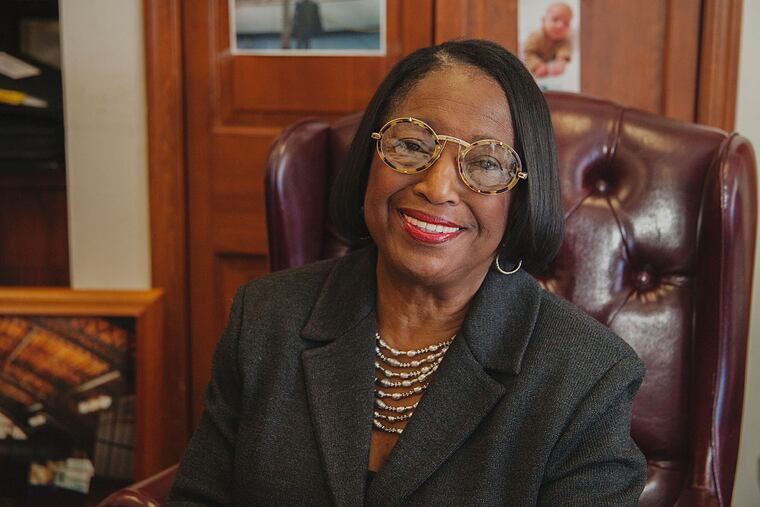Tasco questions need for city commissioners
When Marian Tasco became a city commissioner in 1984, she expected to have her hands full running Philadelphia's far-flung election operations.

When Marian Tasco became a city commissioner in 1984, she expected to have her hands full running Philadelphia's far-flung election operations.
She was quickly disabused of that notion.
"I really had nothing to do," Tasco said in an interview last week, explaining that she discovered that the day-to-day work was handled by the city service staff.
The three elected city commissioners were there just to set policy during their weekly meetings.
"What I did to keep myself busy and engaged," Tasco said, "I began working with the students, high schools, setting up voter registration, voter education programs."
Her experience has led the former City Council member to join a growing chorus of critics who question the need for the elected positions at all.
Tasco's call comes on the eve of Tuesday's presidential primary and at a time when the good-government group Committee of Seventy is making a push to abolish the Office of City Commissioners. The change would require City Council's approval, followed by voter approval.
David Thornburgh, CEO of the Committee of Seventy, said he would like to see an elections chief appointed by the mayor to oversee the civil service staff. Thornburgh is hoping that Tasco, who retired in December from a 28-year career on Council, can have some sway on her former colleagues.
"Her voice has enormous influence," Thornburgh said. "A: She was in the job. B: She's been a longtime powerful voice on the political stage."
Tasco said that she hasn't spoken to any of the Council members about eliminating the city commissioners. But she hopes others will.
"I think the Committee of Seventy has to do the research and present a plan that's reasonable that people can buy into and have a discussion around to come to some resolution," she said. "I don't think a fight would be helpful."
Committee of Seventy has unsuccessfully pushed to abolish the city commissioners in the past.
The civic watchdog group has renewed its call following a series of stories in the Inquirer about the work habits of commissioners chairman Anthony Clark, who has acknowledged that at times he rarely showed up at his City Hall office.
The commissioners have pushed back on the proposal to abolish their office, saying that the three elected positions, with at least one going to the minority party, assures bipartisan oversight of elections. An appointed official would give power to one party, they say.
"It's better to have all the people decide," who will oversee elections, Commissioner Lisa Deeley said.
Deeley also disagreed with Tasco's narrative that there isn't much work for the commissioners.
"There's work to be done," Deeley said, pointing to her list of more than three dozen schools, senior centers, and civic associations she has gone to speak to about voting. She said her staff is busy fielding phone calls from the public on voter registrations and changes in polling locations.
In addition, the commissioners filmed a public service announcement in an attempt to increase voter turnout and had the Water Department and PGW include an election date reminder in residents' water and gas bills, none of which cost the city money.
The city commissioners serve as the city's Board of Elections and have a $9.6 million budget that covers 98 full-time employees who work year-round to prepare for primary, general, and special elections.
Per the state election code, the commissioners' responsibilities include selecting polling places, purchasing and maintaining voting machines, issuing certifications to poll watchers, and publishing notices on forthcoming elections. Most of the actual work is delegated to the staff, and commission members vote to approve policy and personnel changes. The commissioners also have to certify election results.
When the commissioners are running for reelection, as Clark and vice chair Al Schmidt did last year, their duties are further limited. They may not act as the board of elections. Common Pleas Court Judges Lori A. Dumas and Paula A. Patrick were acting commissioners from February through November. Yet, the commissioners maintained their full salaries during that time.
The chairman is paid $138,612; the two others receive $129,373. Each commissioner is allotted a personal staff with costs for all three totaling $1.1 million.
In a Facebook posting, Tasco contended that money could be put to better use.
"I am convinced an appointed system would save money, which would be better spent on critical priorities like pre-K education," she said.
According to city officials, $1 million would pay for 118 children to attend pre-K.
Tasco said that while the work that the commissioners are doing on voter education is good, it could also be done by volunteers. She said that an elections board is still needed but that it should be part-time as it is in the surrounding counties.
"It's not to get rid of them to just get rid of it," Tasco said. "I think the office has to have a charge. Their charge is to run the election process, oversee disputes, and rule on those, but it's not something that you do every day as a commissioner."
215-854-5520
@InqCVargas